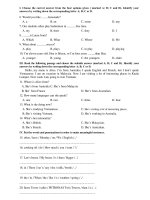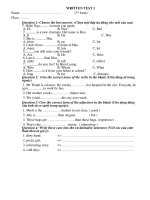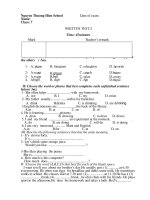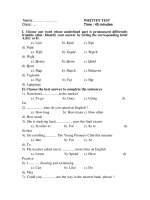- Trang chủ >>
- Văn Mẫu >>
- Văn Biểu Cảm
DA va De kiem tra Tieng Anh 124 giua ky I 1718 Tr Nguyen Trai
Bạn đang xem bản rút gọn của tài liệu. Xem và tải ngay bản đầy đủ của tài liệu tại đây (141.05 KB, 6 trang )
<span class='text_page_counter'>(1)</span>SỞ GD & ĐT THÁI BÌNH TRƯỜNG THPT NGUYỄN TRÃI. ĐỀ KIỂM TRA GIỮA HỌC KỲ I NĂM HỌC 2017 - 2018 MÔN: TIẾNG ANH 12 Thời gian làm bài: 60 phút. Mã đề thi 004 Họ, tên thí sinh:.......................................................................... Số báo danh:............................................................................... I. Mark the letter A, B, C or D on the answersheet to indicate the word whose underlined part differs from the other three in pronunciation in each of the following sentences. Question 1: A. watched B. forced C. worked D. solved Question 2: A. typist B. typical C. typing D. stylish II. Mark the letter A, B, C, or D on your answer sheet to indicate the word that differs from the other three in the position of primary stress in each of the following questions. Question 3: A. attract B. open C. aside D. suppose Question 4: A. defensive B. typical C. domestic D. disaster III. Mark the letter A, B, C, or D on your answer sheet to indicate the correct answer to each of the following questions. Question 5: __________I didn’t understand a word, I kept smiling. A. Whereas B. However C. Even though D. Nevertheless Question 6: She asked me _______. A. are you interested in working for me B. that I was interested in working for her C. if was I interested in working for her D. whether I was interested in working for her Question 7: If you me early, I would have given it to you. A. have told B. told C. had told D. tell Question 8: English children don’t have to pay fees if they go to _______ schools. A. state B. public C. independent D. private Question 9: When their first child was born, they _______ for three years. A. have been married B. had been married C. will be married D. will have been married Question 10: Stress and tiredness often lead to lack of_______ A. concentrate B. concentration C. concentrating D. concentrator Question 11: Real Madrid will attempt to become the first team __________ successfully their UEFA Champions League crown against Juventus on 3 June. A. defended B. defending C. to defend D. who defended Question 12: Roberta was the first person _______ to speak at the meeting. A. asked B. to ask C. to be asked D. who asked Question 13: Lots of houses _______ by the earthquake. A. are destroying B. destroyed C. were destroying D. were destroyed Question 14: _________he arrived at the bus stop than the bus came..
<span class='text_page_counter'>(2)</span> A. No longer has B. No sooner had C. Not until had D. Hardly had Question 15: They are a very _______ family and very supportive of one another. A. obedient B. secure C. close-knit D. wise Question 16: In recent days pork prices have dipped to a record low and also ________ lowest in the world. A. the B. an C. a D. no article IV. Mark the letter A, B, C, or D on your answer sheet to indicate the underlined part that needs correction in each of the following questions. Question 17: Get up early can be very difficult for some people. A. Get up B. can be C. difficult D. some people Question 18: You can apply for a better job when you will have had more experience. A. apply for B. more experience C. will have had D. when Question 19: She has a lot of interested ideas, but they're not very practical. A. a lot B. interested C. but D. very V. Mark the letter A, B, C, or D on your answer sheet to indicate the word or phrase that is CLOSEST in meaning to the underlined part in each of the following questions. Question 20: Our parents join hands to give us a nice house and a happy home. A. take hands B. hold hands C. work together D. shake hands Question 21: We can use either verbal or non – verbal forms of communication. A. using gesture B. using speech C. using verbs D. facial expression VI. Mark the letter A, B, C, or D on your answer sheet to indicate the word or phrase that is OPPOSITE in meaning to the underlined part in each of the questions. Question 22: The twin girls are so identical that I can't distinguish one from the other. A. changeable B. similar C. alike D. different Question 23: Certain courses are compulsory; others are optional. A. voluntary B. free C. pressure D. mandatory VII. Mark the letter A, B, C, or D on your answer sheet to indicate the most suitable response to complete each of the following exchanges. Question 24: Tom: "Wasn't it Mozart who composed Swan Lake?" - Mary: "________" A. It is not my favorite. B. Yes, he wasn't. C. It's out of question. D. I haven't a clue. Question 25: Linda: “You look very nice in that dress, Maria!” - Maria: “_______” A. Yes, I think so B. Don’t mention it C. Thank you very much D. I’m afraid not VIII. Mark the letter A, B, C, or D on your answer sheet to indicate the sentence that is CLOSEST in meaning to the sentence given in each of the following questions. Question 26: I have never tasted this kind of food before. A. I have tasted this kind of food. B. I tasted this kind of food long time ago. C. It is the first time I tasted this kind of food. D. It is the first time I have ever tasted this kind of food. Question 27: John said, “You’d better not lend them any money, Daisy." A. John ordered Daisy not to lend them any money..
<span class='text_page_counter'>(3)</span> B. John commanded Daisy not to lend them any money. C. John asked Daisy if she had lent them any money. D. John advised Daisy not to lend them any money. Question 28: I will agree to these conditions provided that they increase my salary. A. They did not increase my salary so I quit the job. B. I will only agree these conditions if they give me more money. C. They give me more money or I will only agree these conditions. D. Unless they give me more money, I will only agree these conditions. IX. Mark the letter A, B, C, or D on your answer sheet to indicate the sentence that best combines each pair of sentences in the following sentences. Question 29: John is studying hard. He doesn't want to fail the next exam. A. John is studying hard in order that he not fail the next exam. B. John is studying hard in order not to fail the next exam. C. John is studying hard in order to not to fail the next exam. D. John is studying hard so as to fail the next exam. Question 30: I did not arrive in time. I was not able to see her off. A. She had left because I was not on time. B. I was not early enough to see her off. C. I did not go there, so I could not see her off. D. I arrived very late to say goodbye to her. X. Read the following passage and mark the letter A, B, C, or D on your answer sheet to choose the word or phrase that best fits each of the numbered blanks. Speech is one of the most important (31) _______ of communicating. It consists of far more than just making noises. To talk and also to (32) _______ by other people, we have to speak a language, that is, we have to use combinations of sounds that everyone agrees to stand for a particular object or idea. Communication would be impossible if everyone made up their own language. Learning a language properly is very (33) _______. The basic vocabulary of English is not very large, and not only about 2,000 words are needed to speak it quite (34) _______. But the more idea you can express the more precise you can be about their exact meaning. Words are the main thing we use in communicating what we want to say. The way we say the words is also very important. Our tone of voice can express many emotions and (35) _______ whether we are pleased or angry, for instance. Question 31: A. rules B. reasons C. ways D. tests Question 32: A. be understood B. be spoken C. be examined D. be talked Question 33: A. easy B. expensive C. simple D. important Question 34: A. perfect B. good C. well D. fluent Question 35: A. know B. show C. ask D. understand XI. Read the following passage and mark the letter A, B, C or D on your answer sheet to indicate the correct answer to each of the following questions from 36 to 43. The official residence of the president of the United States is the White House, located at 1600 Pennsylvania Avenue, in Washington, D.C. The Commissioners of the District of Columbia held a meeting in 1792 and decided to hold a contest for the best design for the Presidential House. James Hoban, an architect born in Ireland, was the winner. His bid for the construction of the mansion asked for $200,000, but the final cost of the building came to twice that amount. The work on the project began during the same year, and the grounds of approximately one and a half miles west of.
<span class='text_page_counter'>(4)</span> the Capitol Hill were chosen by Major Pierre Charles L'Enfant, who was in charge of city planning. However, the construction continued for several more years, and George Washington had stepped down (leave an important job) as president before the building was habitable. When John Adams, the second president of the United States and his wife Abigail moved in in 1800, only six rooms had been completed. The grey sandstone walls of the house were painted white during construction, and the color of the paint gave the building its name. The building was burned on August 24, 1814, and James Hoban reconstructed the house for President James Monroe and his family, who moved there in 1817. The north portico was added to the building in 1829, water pipes were installed in 1833, gas lighting in 1848, and electricity in 1891. In 1948, inspectors announced that the building was so dilapidated that it was beyond repair and suggested that it was cheaper to construct a new one than repair the existing dwelling. However, the national sentiment was to keep the original form intact, and Congress appropriated $5.4 million dollars for repairs. In 1961, Jacqueline Kennedy launched a program to redecorate the rooms and appointed a Fine Arts Committee to make choices of furnishing and colors. The house of the president accords its residents a great deal of space. The living quarters contain 107 rooms, 40 corridors, and 19 baths. The White House contains a doctor's suite, a dentist's office, a large solarium, a broadcasting room, and a two-floor basement for storage and service rooms. The office in which the president works is not located in the White House, but in a separate building called the West Wing. The White House stands on 16 acres of parklike land and overlooks a broad lawn, flower gardens, and wood groves. Question 36: What does the passage imply about the cost of the White House construction? A. It was proposed at the meeting of the commissioners. B. It did not adhere to the original estimate. C. It was not included in the architectural design. D. It was considered excessive for the presidential home. Question 37: In paragraph 1, the word "grounds" is closest in meaning to ______. A. high ground B. several lots C. site D. hills Question 38: It can be inferred from the passage that ______. A. George Washington often used the White House steps B. George Washington contributed to the White House design C. George Washington never lived in the White House D. The White House was excluded from the city planning Question 39: The author of the passage implies that the construction of the main White House building continued ______. A. up to 1800 B. after 1800 C. until 1814 D. until 1792 Question 40: In paragraph 2, the word "dilapidated" is closest in meaning to ______. A. ornate B. run-down C. old-fashioned D. obscure Question 41: What can be inferred about the White House from the information in the second paragraph?.
<span class='text_page_counter'>(5)</span> A. Few changes occurred in the structure in the first half of the 20th century. B. The building was modernized extensively during one decade. C. Running water was installed in the second half of the 19th century. D. Each president added new features to the building's conveniences. Question 42: In paragraph 2, the word "launched" is closest in meaning to ______. A. lauded B. lavished C. requested D. began Question 43: The passage mentions all of the following White House premises EXCEPT ______. A. hallways B. storage rooms C. kitchen D. medical offices XII. Read the following passage and mark the letter A, B, C or D on your answer sheet to indicate the correct answer to each of the following questions from 44 to 50. Langston Hughes was one of the greatest American writers of the twentieth century. He was born in Joplin, Missouri, and moved to Cleveland at the age of 14. Several years later he spent one year in Mexico before attending Columbia University in New York. For a few years after that, he roamed the world as a seaman, visiting ports around the world and writing some poetry. He returned to the United States and attended Lincoln University, where he won the Witter Bynner Prize for undergraduate poetry. After graduating in 1928, he traveled to Spain and to Russia with the help of a Guggenheim fellowship. His novels include Not without Laughter (1930) and The Big Sea (1940). He wrote an autobiography in 1956 and also published several collections of poetry. The collections include The Weary Blues (1926), The Dream Keeper (1932), Shakespeare in Harlem (1942), Fields of Wonder (1947), One Way Ticket (1947), and Selected Poems (1959) A man of many talents, Hughes was also a lyricist, librettist, and a journalist. As an older man in the 1960s, he spent much of his time collecting poems from Africa and from African-Americans to popularize black writers. Hughes is one of the most accomplished writers in American literary history, and he is seen as one of the artistic leaders of the Harlem Renaissance, the period when a neighborhood that was predominantly black produced a flood of great literature, music, and other art forms depicting daily city life for African-Americans. Question 44: What is the main topic of this passage? A. The life of Langston Hughes B. The Harlem Renaissance C. African-American writers D. American twentieth-century writers Question 45: Where was Langston Hughes born? A. Spain B. New York C. Missouri D. North Carolina Question 46: To which of the following movements might Shakespeare in Harlem refer? A. The Civil War B. The Harlem Riots C. The Harlem Renaissance D. The Civil Rights Movement Question 47: What provided Hughes with assistance for his travel to Spain and Russia? A. His job as a reporter B. His career as a soldier C. A literary fellowship D. A college study program Question 48: The word "talents" in the passage could be replaced by which of the following?.
<span class='text_page_counter'>(6)</span> A desires B. abilities C. strategies D. careers Question 49: Which of the following could best replace the word "accomplished" as used in the passage? A. successful B. prolific C. brilliant D. imaginative Question 50: According to the passage, Langston Hughes was all of the following EXCEPT_____: A.a novelist B. a poet C. a historian D. a journalist. ----------- HẾT ----------.
<span class='text_page_counter'>(7)</span>









